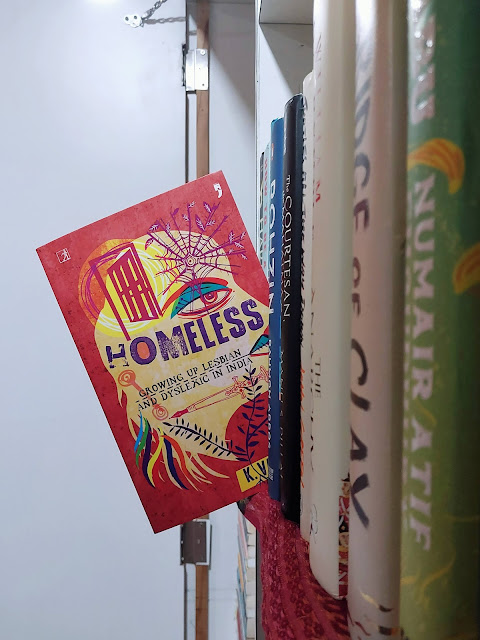Organisations in urban India, OTT media services, and the gig economy are slowly becoming inclusive of the LGBTQIA+ community. However, it’s also important to acknowledge that in rural India, which constitutes about 65% of the population, queer individuals struggle against sexual repression and spend a good part of their lives suffering psychologically as they still risk being subjected to conversion therapies, physical violence, and sometimes, even family-sanctioned corrective rapes. The thriving moralism, religionism, and cultural nationalism in contemporary India is engendering a more conservative and heteronormative society and a youth whose traditional values are increasingly at odds with the principles of equal rights for queer folks. Widespread societal bias and prejudice, often perpetuated by those adhering to heteronormativity, have led to a common misconception that queer individuals are prone to trauma and suffering. While Chatterjee labelling this overly generalising perspective, a liberal view may not be accurate, he successfully challenges it through his translation of Krishnagopal Mallick’s queer fiction, which defies such limiting stereotypes and offers a nuanced portrayal of LGBTQ+ experiences.
In the rich tapestry of Indian literature, the voices of LGBTQ+ individuals often find expression in regional languages, offering authentic and diverse perspectives on sexuality and identity. Unfortunately, many of these nuanced narratives have been overlooked or marginalised due to their divergence from heteronormativity. Translation emerges as a vital tool, a bridge that allows these hidden stories to resurface and flourish. It preserves the cultural nuances and authentic voices and challenges the pervasive homophobia that has marginalised them. ‘Entering the Maze’ is one such attempt to bring these voices into the spotlight and celebrate the richness of India’s LGBTQ+ literary heritage.
‘Entering the Maze’ is a collection of queer fiction stories by Krishnagopal Mallick, translated from Bengali by Niladri R. Chatterjee. The book is divided into four parts: an introduction by the translator, two short stories titled ‘The Difficult Path’ and ‘Senior Citizen,’ and lastly, the novella ‘Entering the Maze’ (initially published in May 1993).
In the introduction, Chatterjee introduces us to the world of Krishnagopal Mallick’s literary works and dives deep into it, drawing connections between his texts, his worldview, his life, and the profound influence of his homosexuality. Chatterjee references a passage from Mallick’s memoir ‘Hujugani,’ where he writes about ‘Byuhprabesh’ and mentions that he never resorted to imagination, validating that the work is not entirely fictional and complements the cover, featuring two identical figures, blurring the lines between reality and fiction. He compares Mallick with his contemporaries globally, nationally, and regionally in terms of queer themes, sources of inspiration, the use of author surrogate, and their romantic involvements. The scope of his comparisons spans from the French Nobel Laureate Andre Gide to E.M. Forster and even includes the Gujarati artist Bhupen Khakhar. Yet, he concludes, seldom do writers approach the innocent candour with which Krishnagopal Mallick presents stories of his boyhood and homosexuality in print, all while leading a contented married life with a child.
In ‘The Difficult Path,’ the 58-year-old narrator leads you on a journey through College Square in North Kolkata, observing and chronicling every subtle and monumental transformation. During a chance encounter with a lost boy near a concert venue, their journey together becomes a metaphorical exploration, depicted through a stoned and muddy path, raising questions about intentions and boundaries leaving readers with lingering thoughts. The story skilfully weaves the narrator’s reflections on the evolving spaces of Kolkata and human connection.
Sensual undertones are Krishnagopal Mallick’s hallmark, cleverly threaded with provocative details like a reference to a VIP Frenchie commercial. Similar to ‘The Difficult Path,’ ‘Senior Citizen’ also places readers in a morally challenging predicament. The author artfully employs irony to craft the persona of an elderly narrator. The story sets your moral judgment on an unpredictable course, prompting recalibration and a deliberate examination of right and wrong. However, what becomes evident is that the situation presented is far from being clear-cut; it resides in shades of grey. Despite a conspicuous absence of concern for issues like consent, the author adroitly blurs the line between consensual and non-consensual acts of intimate contact. This deft handling of a sensitive subject, conveyed with playful and mischievous authenticity, reflects the reality of such situations, ultimately underscoring the paramount importance of consent.
Finally, the pièce de résistance within this anthology of queer fiction presents itself—the novella bearing the title ‘Entering the Maze.’ It stands as a prime exemplar of the most candid and timeless coming-of-age literature. Within its pages unfolds a richly layered and subtly nuanced narrative, an exploration of boyhood, puberty, and the intricate journey toward self-discovery. The author employs a fourteen-year-old protagonist as a surrogate, charting the course of his life over a single year against the backdrop of post-Indian Independence Kolkata in 1950-51. The narrative embarks on a resounding note, providing readers with a glimpse of what awaits within its chapters. The novella begins with a portrayal of Gopal in shorts, and his transition to embracing dhotis and pyjamas towards the end symbolises his coming of age. Gopal’s fervent engagement in crafting a detective novel and the ingenious interplay of nested narratives illuminate the author’s unquenchable thirst for literature during his formative years. In a profound manner akin to the preceding short stories, ‘Entering the Maze’ unflinchingly captures the essence of the coming-of-age experience. It confronts the unspoken aspects of this transformative journey, which often remain concealed. These pivotal years, marred by the struggle to conform to prescribed notions of femininity or masculinity, bear profound significance.
The novella also features the influx of Bengali Hindu refugees from East Pakistan, the spectre of recurring riots, and haunting memories of war. The novella illustrates how these experiences shape the lens through which teenagers perceive the world. The author adeptly navigates these intricate layers, summoning vivid imagery and seamlessly traversing the terrain of adolescent self-discovery. The ordinary rituals of student life - the pursuit of geographical knowledge, the recitation of poems, and the fascination with stamp collection - all find a place within this novella’s pages. Each page, every line, and every word reverberates with profound meaning, offering readers a glimpse into the invaluable treasures concealed within its narrative depths.
Krishnagopal Mallick’s unreserved and unapologetic expression of his homosexuality tells you what it means to embrace your sexuality; it’s like, through his queer fiction, he shows you that he takes pride in being a homosexual man without ever saying the word “pride”. Such innocent, honest, and vibrant narratives of coming-of-age and the exploration of one’s sexuality have the power to ignite hope anew. As Chatterjee concludes his introduction, and I concur, we must bring such books back on the shelves. They not only enlighten us but also empower those who continue to fight for their right to love freely and authentically.



































